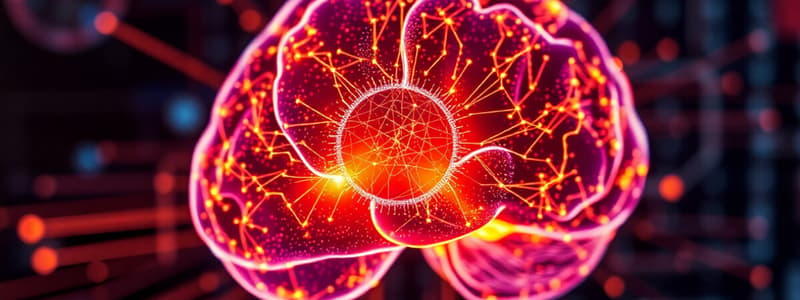Podcast
Questions and Answers
What does the term 'props' refer to in the context of a script?
What does the term 'props' refer to in the context of a script?
- The sequences of events that occur during the script
- The objects involved in the events described in the script (correct)
- The actions performed by participants in the script
- The conditions that must be satisfied for the script to be activated
In the context of a script, what do 'entry conditions' represent?
In the context of a script, what do 'entry conditions' represent?
- The specific sequences that must happen in order
- The necessary conditions needed to initiate the script (correct)
- The expected outcomes after the script is executed
- The roles played by participants in the scenario
How do 'tracks' differ from the general script model?
How do 'tracks' differ from the general script model?
- They depict an alternative scenario within the general pattern (correct)
- They represent an essential participant in the script
- They are always the first step in the execution of a script
- They are the conditions that must be fulfilled for a script to initiate
Which of the following best describes 'production rules'?
Which of the following best describes 'production rules'?
What is the primary function of 'roles' in a script?
What is the primary function of 'roles' in a script?
What is the primary function of ganglion cells in the eye?
What is the primary function of ganglion cells in the eye?
Which factor affects brightness perception?
Which factor affects brightness perception?
Which stage of vision involves the physical reception of stimuli?
Which stage of vision involves the physical reception of stimuli?
What aspect of visual perception helps to perceive size and depth?
What aspect of visual perception helps to perceive size and depth?
Which type of vision is primarily mediated by rods?
Which type of vision is primarily mediated by rods?
What phenomenon aids in reading and involves delving into the shapes of words?
What phenomenon aids in reading and involves delving into the shapes of words?
Which of the following illusions demonstrates the effect of context on visual perception?
Which of the following illusions demonstrates the effect of context on visual perception?
What is the result of color blindness as mentioned in the content?
What is the result of color blindness as mentioned in the content?
What effect does the 'total time hypothesis' suggest about information retention?
What effect does the 'total time hypothesis' suggest about information retention?
Which of the following best defines 'interference' in the context of memory forgetting?
Which of the following best defines 'interference' in the context of memory forgetting?
Which statement is correct regarding recall and recognition?
Which statement is correct regarding recall and recognition?
What is a potential issue with misapplied deductive reasoning?
What is a potential issue with misapplied deductive reasoning?
How does emotion affect the process of remembering information?
How does emotion affect the process of remembering information?
What type of reasoning can produce necessary conclusions from given premises?
What type of reasoning can produce necessary conclusions from given premises?
What best describes the 'distribution of practice effect'?
What best describes the 'distribution of practice effect'?
Which of the following is not a type of reasoning mentioned in the content?
Which of the following is not a type of reasoning mentioned in the content?
What is the primary reason for a general to split his men into small groups when attacking a fortress?
What is the primary reason for a general to split his men into small groups when attacking a fortress?
Which type of error is characterized by having the right intention but failing to execute it correctly?
Which type of error is characterized by having the right intention but failing to execute it correctly?
How does negative affect influence problem-solving capabilities according to the content?
How does negative affect influence problem-solving capabilities according to the content?
Which of the following is NOT listed as an implication for interface design when considering emotional responses?
Which of the following is NOT listed as an implication for interface design when considering emotional responses?
Which of the following best describes the significance of understanding user psychology in interface design?
Which of the following best describes the significance of understanding user psychology in interface design?
What is the main limitation of inductive reasoning?
What is the main limitation of inductive reasoning?
What does abduction primarily involve?
What does abduction primarily involve?
In the context of problem space theory, what comprises a problem?
In the context of problem space theory, what comprises a problem?
How does analogy function in problem-solving?
How does analogy function in problem-solving?
What characterizes skilled problem-solving according to the skill acquisition section?
What characterizes skilled problem-solving according to the skill acquisition section?
What does the Gestalt theory suggest about problem-solving?
What does the Gestalt theory suggest about problem-solving?
In Wason's cards example, what is required to determine the validity of the statement?
In Wason's cards example, what is required to determine the validity of the statement?
What is a key aspect of productive problem-solving?
What is a key aspect of productive problem-solving?
Study Notes
Human Information Processing
- Humans receive information through sight, sound, touch, and movement.
- Memory is divided into sensory, short-term, and long-term memory.
- Human information processing includes reasoning, problem-solving, skills, and errors.
- Emotions influence human capabilities.
Vision
- Vision takes place in two stages: physical reception of light and processing & interpretation of the stimuli.
- The eye receives light and transforms it into electrical signals.
- Light reflected from objects is focused upside down on the retina.
- The retina contains rods for low light vision and cones for color vision.
- Ganglion cells detect patterns and movement.
Interpreting the Signal
- Size and Depth: visual angle indicates how much of the view an object takes up, related to size and distance from the eye.
- Visual Acuity: the ability to perceive detail, it is limited.
- Brightness: a subjective reaction to levels of light, affected by the luminance of the object.
- Color: made up of hue, intensity, and saturation, cones are sensitive to color wavelengths.
Reading
- Reading involves several stages: visual pattern perception, decoding using internal language representations, and interpretation using knowledge of syntax, semantics, and pragmatics.
- Reading involves saccades (rapid eye movements) and fixations (pauses).
- Perception occurs during fixations.
- Word shape is important for recognition.
- Negative contrast improves reading from computer screens.
Hearing
- Hearing provides information about the environment, such as distances, directions, and objects.
Long-Term Memory (LTM) - Scripts
- LTM stores stereotypical information required to interpret a situation.
- A script is a model of how to behave in a given situation.
- Scripts have elements that can be instantiated with values for context.
Long-Term Memory (LTM) - Production Rules
- Production rules represent procedural knowledge, our knowledge of how to do something.
- They function as condition/action rules, where if a condition is met, a rule is applied to determine an action.
Long-Term Memory (LTM) - Storage of Information
- Rehearsal moves information from short-term memory to long-term memory.
- The total time hypothesis states that the amount of information retained is proportional to rehearsal time.
- The distribution of practice effect optimizes learning by spreading learning over time.
- Structure, meaning, and familiarity make information easier to remember.
Long-Term Memory (LTM) - Forgetting
- Two main theories of forgetting are decay (information is lost slowly) and interference (new information replaces old information).
- Memory is selective and influenced by emotion.
Long-Term Memory (LTM) - Retrieval
- Two types of information retrieval are recall (reproducing information from memory) and recognition (identifying information previously seen).
Thinking
- Reasoning is the process of using knowledge to draw conclusions or infer something new.
- Reasoning can be deductive, inductive, or abductive.
Deductive Reasoning
- Deduction involves deriving logically necessary conclusions from given premises.
- A logically valid conclusion may not always be true.
- Humans bring real-world knowledge into reasoning processes.
Inductive Reasoning
- Induction makes generalizations from observed cases to unseen cases.
- Unreliable: can only prove false, not true.
- Humans are not good at using negative evidence.
Abductive Reasoning
- Abductive reasoning reasons back from a fact to the action or state that caused it.
- It can lead to inaccurate explanations.
Problem Solving
- Problem solving involves finding a solution to an unfamiliar task using knowledge.
- Theories include Gestalt, Problem Space Theory, Analogy, and Skill Acquisition.
Errors and Mental Models
- Two types of errors are slips (wrong action but correct intention) and mistakes (wrong intention).
Emotion
- Affect is the biological response to physical stimuli, influencing how we respond to situations.
- Positive affect leads to creative problem-solving, while negative affect leads to narrow thinking.
Individual Differences
- Individual differences are long-term (gender, physical/intellectual abilities), short-term (effects of stress/fatigue), and changing (age).
Psychology and the Design of Interactive Systems
- Design decisions should avoid excluding a section of the user population.
- To apply psychological principles correctly, context and experimental conditions must be considered.
Studying That Suits You
Use AI to generate personalized quizzes and flashcards to suit your learning preferences.
Related Documents
Description
Explore the fascinating processes of human information processing in this quiz. From the stages of vision to the nuances of memory, you'll learn about how we perceive and interpret stimuli from our environment. Discover the roles of emotion and reasoning in shaping our experiences.




